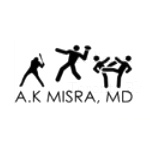Health Tips brought to you by U.S. HealthWorks Medical Group. Our experienced medical experts provide information here that we hope will broaden your healthcare knowledge.
Due to a recent outbreak of Shigella in California, Dr. A.K. Misra, medical director for U.S. HealthWorks in South San Francisco, is answering a few questions today about this lesser known food-borne illness. Dr. Misra is also double Board Certified in Sports Medicine and Internal Medicine.
Q: In wake of the food poisoning episode in San Jose, what can you share about the dangers of eating out?
A: While eating out is generally safe, it does not mean it is advisable or to be taken lightly. The recent Shigella outbreak in San Jose is especially troubling, as this particular bacteria can cause significant, adverse health outcomes ranging from large, loose stools to seizures in children, kidney dysfunction and even death in extreme cases. The problem has since spread beyond Santa Clara County, so all need to be vigilant about it.
Q: What exactly is Shigella, and what is the likely source of it in this case?
A: Shigella is one of the top causes for diarrheal disease on earth, and there are many different types of it. This organism was most likely introduced from the origin of the food source, or the food handlers themselves. It’s still unclear how this happened, and it is important to get to the bottom of the investigation to help avert future episodes.
Q: What steps can people take to identify establishments that are safe for food consumption? How can one really know if a place meets at least some minimum standards of hygiene?
A: Most county agencies provide good consumer information online. For example, I have a colleague who works for the County of Santa Clara as an inspector of dining establishments. The “score” of how well a certain establishment scores is available online. Other counties operate in a similar manner.
As an inspector, my colleague has the authority to shut down an establishment on-site, and her visits are unannounced. I recommend people do their due diligence before choosing where to dine out. I also know of at least one book that has gone into deep detail about food safety and dining out, Fast Food Nation. This is a book I highly recommend, as it speaks to practices of the food industry that I believe all should be informed.
Q: What should someone do if they think they are experiencing symptoms of Shigella?
If one suspects he may have Shigella due to symptoms like loose stools (bloody or otherwise), stomach/abdominal pain and/or other digestive related conditions, it is pivotal to get evaluated in an Emergency Room as soon as possible since that is where a patient can be tested for this pathogen (and others).
Although infection with Shigella (Shigellosis) is a bacterial infection, it only rarely ever requires antibiotics. Most of the time this process is self-limited, provided appropriate supportive care is achieved, namely adequate rehydration and electrolyte replenishment. Over-the-counter medicines for diarrhea are generally not recommended in cases of Shigella.








